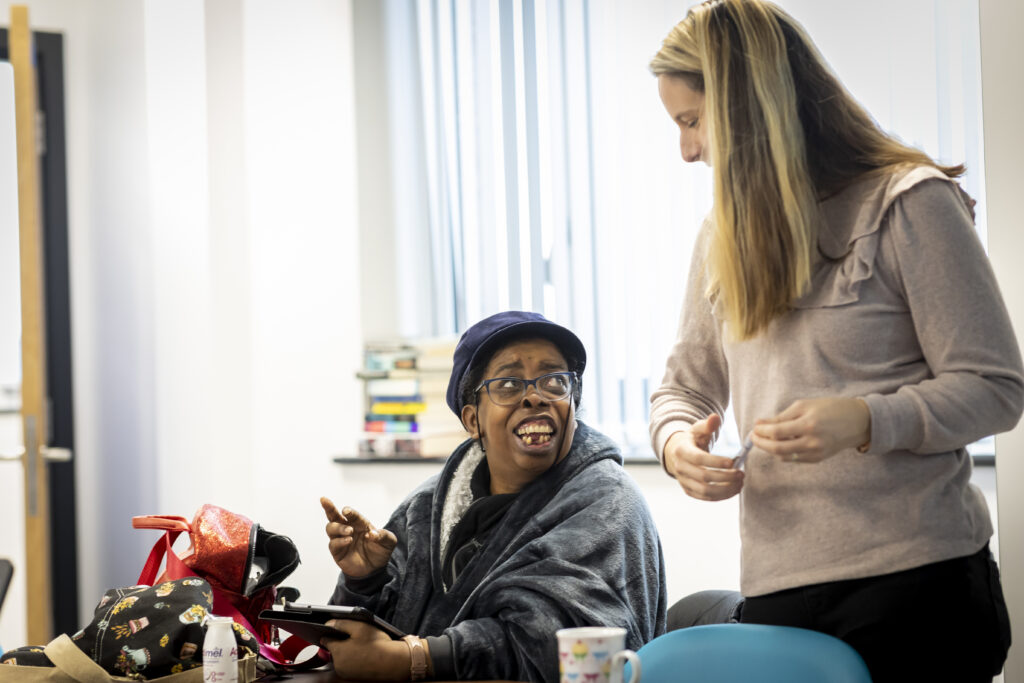
Dementia
What is dementia?
Dementia is a term that describes the symptoms of a group of illnesses that cause progressive changes and declines in cognitive functioning, impacting a person’s memory, thinking, social skills, and physical functioning.
As a disease of ageing, dementia is more common in older people. When diagnosed in people under age 65, it is known as younger onset dementia.
Dementia is more common in women than men – in Australia it is the leading cause of death in women, and international reports show two-thirds of all dementia cases are in women. Researchers are still investigating the reasons for this, but sex and gender both seem to be involved.
In addition, women are more likely to care for people living with dementia. Including both paid and unpaid carers, recent international research shows that around 90% of carers of people with living with dementia are women. Women are also more likely to leave paid work to care for people living with dementia.
Some common signs in women
- Memory loss
- Changes in mood and personality
- Losing or misplacing things
- Confusion about time or place
- Getting lost, even in familiar places
- Problems with speech, writing or comprehension
- Difficulty with conversation and finding words
- Difficulty with solving problems and planning
- Trouble completing everyday tasks
- Sensory challenges, e.g., hypersensitivity to sound, double vision, hallucinations, loss of or changes to taste

Over 100 different diseases can cause dementia. Alzheimer’s Disease is the most common, making up between 50 – 70% of cases. Other common forms of dementia are vascular dementia and dementia with Lewy Bodies – you can learn more about different types of dementia by visiting Dementia Australia.
Being diagnosed and living with dementia
Being diagnosed with dementia can be challenging for the person receiving the diagnosis as well as family members and friends. This is partly due to the lack of effective treatment or a cure, but also because of widespread dementia-related stigma and ageism and a lack of awareness of non-medical support programs among health professionals. Many people living with or caring for someone with dementia receive very limited or no support after being diagnosed, which can be distressing.
However, it is entirely possible to continue to live well with dementia with access to support and by focusing on what we can still do and who we still are, rather than what we have lost.
Increasingly, advocates are calling for dementia to be understood through the lens of ‘neurodiversity’. Seen in this light, support for people living with dementia can be thought of as similar to support for people living with autism and other neurological conditions. This means our society has a responsibility to become ‘dementia-friendly’ to ease the challenges faced by those living with or caring for someone with the condition.
For more information on living with dementia, including how to deal with a diagnosis as well as strategies for managing everyday life, you can:
- Visit Healthdirect Dementia Australia for helpful tips on living well with dementia
- Read the books of UK author Wendy Mitchell on her experience of younger onset dementia (see the Reference list at the bottom of this page)
- Check out the resources of DEEP, the UK Network of Dementia Voices
- Read this leaflet on sensory challenges that may occur with dementia and what helps
- Watch this video on helpful approaches to communication for people with dementia
For support for those of us living with dementia or caring for someone with dementia, you can:
- Speak with a trusted doctor about what support will be most suitable for you.
- Call the National Dementia Helpline on 1800 100 500.
- Visit Dementia Australia for information and support, including peer support options.
Other services you might like to investigate include:
- Groups organised through local councils for people with dementia who are living at home
- Dementia cafes
- Specialist occupational therapy programs for people with dementia.
Some of these services and programs are accessible only through My Aged Care, while others are available privately.
Caring for someone with dementia
Experiences of caring for someone living with dementia are different for everyone. Some people find it manageable, while for others it can be isolating and emotionally challenging, especially without support.
Support from family members and friends or peer support from other carers can make a big difference. Respite care may be helpful, or asking family members or friends if they can stay with your loved one for a short period while you take a break. Contact your local council for carer support groups or contact the Carer Gateway to find support, including free telephone counselling.
If you or the person you are caring for are no longer able to live safely and well at home without assistance, consider having an aged care assessment to explore options for in-home care or residential aged care. More information is available at the My Aged Care website or by calling 1800 200 422. If you are considering residential aged care, if possible, choose a centre that provides high quality specialist dementia care – Dementia Australia has some advice here.
This video from the National Ageing Research Institute features people’s experiences of caring for someone with dementia and advice for other carers.
Advice for family and friends
Although your relationship may change, your continued support and friendship is very important. Take some time to learn a bit more about dementia and what to expect, ask your friend or family member what would be most helpful for them, and let know that you are there for them.
Alzheimers Disease International. (2022) Up to 85% of people with dementia may not receive post-diagnosis care, World Alzheimers Report reveals.
Alzheimers Society UK. (2023) Why is dementia different for women?
Ballenger, J. (2017) Framing confusion: Dementia, society and history. AMA Journal of Ethics.
Bosco A, Schneider J, Coleston-Shields DM, Higgs P & Orrell M. (2019). The social construction of dementia: Systematic review and metacognitive model of enculturation. Maturitas. 120, 12–22. https://doi.org/10.1016/j.maturitas.2018.11.009
Cipriani G & Borin G. (2015). Understanding dementia in the sociocultural context: A review. International Journal of Social Psychiatry, 61(2), 198–204. https://doi.org/10.1177/0020764014560357
Cao Q, Tan C, Xu W, Hu H, Cao X, Dong Q, Tan L, Yu J (2020) The Prevalence of Dementia: A Systematic Review and Meta-Analysis. Journal of Alzheimer's Disease. 73(3): 1157-1166
Chaufan C, Hollister B, Nazareno J, & Fox P. (2012). Medical ideology as a double-edged sword: The politics of cure and care in the making of Alzheimer’s disease. Social Science & Medicine (1982), 74(5), 788–795. https://doi.org/10.1016/j.socscimed.2011.10.033
Chen X, Maguire B, Brodaty H, O'Leary F (2019) Dietary Patterns and Cognitive Health in Older Adults: A Systematic Review. Journal of Alzheimer's Disease. 67(2): 583-619
Dementia Australia (nd) About dementia | Dementia Australia
Dementia Australia (nd) Brain health tips and strategies | Dementia Australia
Dementia Australia (nd) Memory changes | Dementia Australia
Fletcher J (2019) Destigmatising dementia: The dangers of felt stigma and benevolent othering. Dementia. 20:2, 417-426
Healthdirect (2022) Dementia - early signs, symptoms, treatment and statistics
Kiumurra A, Sugimoto T, Kitamori K, Saji N, Niida S, Toba K, Sakurai T (2019) Malnutrition is Associated with Behavioral and Psychiatric Symptoms of Dementia in Older Women with Mild Cognitive Impairment and Early-Stage Alzheimer’s Disease. Nutrients. 11(8): 1951
Livingston G, Huntley J, Sommerlad A, Ames A, Ballard C (2020) Dementia prevention, intervention, and care: 2020 report of the Lancet Commission - The Lancet. The Lancet Commissions. 396(10248):413-446
Mitchell, W (2019) Somebody I Used to Know. Penguin Random House
Mitchell, W (2022) What I Wish People Knew About Dementia: From Someone Who Knows. With Anna Wharton. Bloomsbury.
Murman DL (2015) The Impact of Age on Cognition. Seminars in Hearing Journal. 36(3): 111-121.
Podcasy JL, Epperson CN (2016) Considering sex and gender in Alzheimer disease and other dementias. Dialogues Clinical Neuroscience 18(4), 437–446.
Szoeke C, Lehert P, Henderson VW, Dennerstein L, Desmond P, Campbell S (2016) Predictive Factors for Verbal Memory Performance Over Decades of Aging: Data from the Women's Healthy Ageing Project. The American Journal of Geriatric Psychiatry. 24(10): 857-867
The World Health Organisation (2022) Brain health (who.int)
The World Health Organisation (2023) Dementia (who.int)
The World Health Organisation (2019) Risk reduction of cognitive decline and dementia: WHO guidelines
Wiersma E, Harvey D, Caffery P (2023) “I’m still the queen and I’m still on my throne…”: Women’s reflections on gender and living with dementia. Journal of Women and Ageing. 35(1): 113-127





